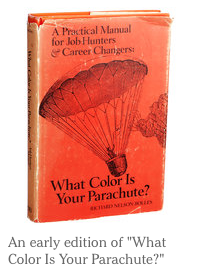Articles
Dan Pink's article in Fast Company
Written about What Color Is Your Parachute? 15 years ago, by the renowned Dan Pink, a lot has changed since: more sales (over 10,000,000 now), different family history (I've been married to my beloved Marci for ten years,) different President. Still, Dan is a good writer, and it was an interesting interview. Here is a passage from it:
And, over the past three decades, Bolles's preferred method has remained remarkably consistent: Sending out résumés doesn't work. Neither does answering ads. Employment agencies? No way. What does work is figuring out what you like to do and what you do well — and then finding a place that needs people like you. Contact organizations that you're interested in, even if they don't have known vacancies. (Bolles actually coined the now commonplace term "informational interview.") Pester friends and family members for leads. Once you get in the door of the employer of your dreams, show how you can solve its problems."
What We Owe Returning Vets
Author: Dick Bolles

Some men and women in America are combat veterans. Films like American Sniper, Hurt Locker, and Lone Survivor have opened the door to our understanding what a sacrifice combat veterans have made for us. But actually, a veteran is anyone who has served in the Armed Forces of the United States. There are more than 21,200,000 veterans in the U.S.
What do we owe them? Four things, it seems to me.
(1) REMEMBRANCE. Some of them laid down their lives for us, in the service of fighting oppressors and architects of evil. These veterans are gone, now, at least from earthly view. Except among their families and friends, it is easy to forget their sacrifice. That was, after all, yesterday. So, once a year we have a Veterans Day when we deliberately remember, anew. We visit cemeteries, or crypts, or the graves of the Unknowns. We hold parades and concerts and solemn services, remembering all who laid their lives for us, in what Jesus called, "no greater love than this." Hoping they can hear, even in another world, our undying gratitude for their sacrifice. And we need to do this more than once a year.
(2) CELEBRATION. 2,600,000 veterans served in recent wars. A million of them are coming home through 2018. The vast majority of them not only came home unscathed, but stronger, braver, more disciplined, more skilled, more mature than they ever were before. They make magnificent employees that any employer would be lucky to hire. This is highlighted in some recent books, such as the November 4 release of "For Love of Country: What Our Veterans Can Teach Us About Citizenship, Heroism, and Sacrifice" by Howard Schultz and Rajiv Chandrasekaran. The armed services were a blessing to them. And to us. And to our workplace.
(3) MERCY & COMPASSION.
Over 90% of those who have just come home, or are coming home, do not —do not—suffer from psychological or mental disabilities. But 250,000 Iraq or Afghanistan veterans do, and have been treated for PTSD. 50,000 veterans are currently homeless, every night. 22 veterans commit suicide every day. Small percentages, from the larger view of things! But percentages be damned! Every single individual is precious in God's sight. One disabled vet is one too many. Anything, anything, we can do to help with the cost of their treatment is an act of mercy and empathy. It not only helps them; it makes each of us better at being a human being that the earth can be proud of. I have given; I hope you will, too.
(4) Lastly CODE-BLUE HELP. Of course returning vets need help in finding employment. Job-hunting is a mystery even to those of us who have never served in the armed forces. It is often even more of a puzzle to returning vets. The unemployment rate is currently 7.2% among male veterans; among female veterans, it's 11.2%. By comparison, among the rest of us it's only 5.8%. Returning vets need help in finding meaningful work. But this means more than just giving them help with writing resumes and conducting interviews. That often is just not enough.
Hospitals have a particular vocabulary that is useful here. The term is "code-blue." It refers to an emergency in which a patient is in cardiopulmonary arrest, requiring a team to rush to the patient and begin immediate extra efforts to pull them through. Much of job-hunting today, for veterans and non-veterans alike, is in a code--blue situation since 2008. Training in resumes and interviews just isn't enough. Returning vets need extraordinary creativity, new approaches, alternative solutions.
So, in the newest edition of Parachute (the 2015, currently in bookstores or online), I added a new 20 page section to help returning vets or those who are trying to help returning vets, find meaningful employment and work. I spent three months researching and evaluating the most helpful resources in approaching code-blue job-hunts. Don't let all that research go to waste. Read it, use it, give it to a returning vet you know.
New York Times Article August 30, 2014
"For A Career Guide: 42 Years of Soft Landings" was a lengthy article published in the Sunday New York Times on August 30, 2014. It was well-written, by Phyllis Korkki.

The Secret of Keeping Hope Alive
Author: Dick Bolles

If you are job-hunting, the most important thing you need to do is to keep hope alive. That is not always easy. . Day after day of sending out resumes, with not a single answer, day after day of searching employers" ads, here or on the Internet, without a single nibble. It is easy to get discouraged. Yet hope is everything. Hope will keep you going, against all odds. Therefore we must understand the rules for keeping hope alive.
Having studied successful job-hunters for over forty years, I have discovered that their most important secret for keeping Hope alive is that from the beginning, the successful ones always have chosen at least two alternatives for every step of their job-hunt:
People who are not good at job-hunting tend to fixate on just one way of doing things.
- In describing what they can do, they use a job-title. Period. ("I'm an engineer.")
- In describing where they want to work, they use a field-title. Period. ("In the computer field.")
- In describing their target, they name large organizations. Period. ("I want to work for GE, or Google, or Apple.")
- In describing how they choose particular places, it's always places with known vacancies. Period. ("I'm studying all the ads and job postings on the Internet.")
- In describing how they get into organizations, they use one way only. Period. ("I'm sending them my resume.")
On the other hand, people who are good at job-hunting figure out alternatives to each of the above. And have them ready at hand. You could call it "their fall-back position," or "Plan B."
- Instead of just job-titles, they can name their individual skills.
- Instead of just field-titles, they can describe their favorite interests.
- Instead of just large organizations, they target small organizations also.
- Instead of just going after vacancies, they go after any place that interests them.
- Instead of just approaching organizations through resumes, they approach them through their personal contacts, or as I call them, "bridge people" (they know you and they know them, so they form a bridge between you and them).
There is magic in having alternatives. The reason is simple. If you have only one way - - one process, one field, one job, one target, and so forth - - and that one way doesn"t work, you have no backup strategy to save you, and so Hope dies.
But you can keep Hope alive if you are obsessed with the idea of always having alternatives - - as a backup plan and strategy. Backups — in case!
During good economic times, people who are good at job-hunting (or career-changing) may stick to the strategies that require the least work: resumes, agencies, and ads or job postings.
But during hard times, or if the above didn't work, they change their strategy, and pursue job-hunting methods that require a lot more work. They spend lots of time doing homework on themselves, researching organizations in detail, doing informational interviewing, building their contacts, and other methods that require work. In other words, like species that survive best in nature, people who are good at job-hunting deliberately adapt to a changing landscape.
People who are bad at job-hunting usually don't. They tend to stay with the same strategies during bad times and good. Namely: resumes, agencies, and ads. When this doesn't work, they usually just do more of it. (Everyone's favorite definition of insanity.) So, if haunting "job boards" for 30 days doesn't get them a job, they spend thirty more days searching the job boards.. It does not occur to them to change their strategy altogether, because economic conditions have changed, particularly since the 2008 great recession.
Alternatives and Hope are married together. I can illustrate this with many examples. But this striking survey result is as compelling as any: It was discovered that in the U.S. one third to one half of all job-hunters simply give up, by the second month. Yikes!
Okay, now the interesting question: why is that?
It turns out the "why" is related to the number of job-hunting methods they used. There are many job-hunting methods to choose from: Answering ads (here or on the Internet); sending out resumes, via the Internet or by direct mail; visiting the Federal/state employment agency; asking family or friends for "leads"; asking friends for vacancies where they work; going to your high school or college placement office; placing an ad on the Internet or in your local paper, as a job-hunter; etc.
A study of 100 job-hunters who were using only one method of job-search, found that 51 of them abandoned their search, by the second month.
By contrast, a study of 100 job-hunters who were using several job-search methods, found that only 31 abandoned their search, by the second month.
I don"t think it"s hard to figure out why this is. As I just said, if you use only one job-hunting strategy - - say, resumes - - and then that strategy doesn"t turn up anything very quickly, you tend to lose Hope. You staked everything on that one strategy. If it doesn"t work, you"re finished.
On the other hand, if you are using two, or more methods, your Hope tends to stay alive - - because, when one method doesn"t work for you, you think to yourself, well surely one of these other methods will pay off - - and so, you keep on going. You keep Hope alive.
How many job-hunting avenues should you use, in order to keep hope alive? Well, it looks as though logically the answer should be: the more job-hunting methods you use, the greater your success will be, at finding a job. No limit.
But, actually it turns out there is a limit. One study revealed that the likelihood of your uncovering those jobs that are out there increases with each additional method that you use, up to four. However, if you use more than four methods, your likelihood of uncovering those jobs that are out there, starts to decrease.
I have pondered this strange finding, and concluded that the reason for this is that if you try to do more than four methods you will end up only taking a stab at each one, rather than giving each the time and thoroughness that it deserves and needs, in order to be effective.
So, by all means add a second alternative (besides, let us say, resumes) to your job-hunting strategies, but do it carefully and thoroughly. And only after investing the appropriate amount of time in that, should you consider adding a third, or - - at most - - a fourth alternative.
When should you go on to another alternative? Basically, it"s when you"ve tried the old method, and it just doesn"t work. Our tendency, altogether too often, is to just do more of it. This is insanity.
So, if you answer ads in the newspapers, if you answer job-postings on the Internet, if you send out your resume everywhere, if you sign up with agencies in vain, and nothing is working, don"t just do more of it. And don"t give up. Change your tactics.
Thus will you keep Hope alive. And that is everything to someone who is out of work, and hunting. Wise job-hunters know from the beginning that they are hunting secondly for a job but first of all for Hope.
How Do You Explain Your Life?
Author: Dick Bolles
We Are, By Nature, Storytellers.

Most of us, anyway. Day by day, we love to tell stories to our family, friends, coworkers, clients, and phone pals: stories about what's happening to those around us, and to our partner, and our children, and how things are going at our job, and what happened to us over the weekend, and what happened to us on our last trip – not to mention the latest fascinating gossip that we've heard somewhere, about somebody. We are storytellers, but we are more.
The sum and total of our life is that, from our birth until our death, we are walking stories, here upon the earth.
Of course we cannot tell the whole story of our life to everyone we meet (though some have been known to try), but most of us pick and choose random bits. And it is always interesting to notice, for ourselves, which stories about our life we choose to tell to others: the everyday stories, or the funny stories or the joyous stories, or the sad, even tragic, stories.
The Story We Tell Ourselves
But, more important than the stories we tell others, is the overarching story we choose to tell ourselves, about our own life.
We choose this overarching story in order to make sense out of all the little stories – this time dealing not with the 'what,' but with the 'why." Why we think 'all this' has happened to us.
Here we enter into the land of fable, myth, philosophy and faith. Here we choose from a menu that the universe has offered to everyman or everywoman, down through the ages.
We get to choose between: our life as a story with ultimate purpose running beneath all that happens to us, like some great underground river; or our life as a string of meaningless events, without rhyme or reason.
We also get to choose between: the story of our life as one where the chief actor on the stage is God, or coincidence is, or some horrific event, that (as we tell it).has crippled our life forever.
The Victim Mentality
All these stories we may choose between, boil down in essence to just two basic categories. Passive or active.
Active stories are where we portray ourselves (to ourselves) as basically in charge of our own life, and responsible – in whole or part – for how our life is turning out.
On the other hand, passive stories are where we portray ourselves (to ourselves) as having been basically the victim of other people's actions, or some tragic event(s) or outside force(s) over which we had no control, so now we are responsible not at all for how our life has turned out.
Which of these two basic categories we choose – to explain our life – is of great consequence, because which we choose, determines whether our life is ever going to change or not. No, that's not overstating the case.
Work on the 10 Percent
Lots of us like to think that if we ever want to change our lives, all we need are some practical tips, some helpful exercises, and a little nod or push, in order to get going.
I thought this myself, once upon a time. But now, many years and ten million job-hunters later, I have learned this just isn't true.
I have learned the most important question you can ask of someone, when they 'say' they want to change their life is, "Do you believe that you have had a lot to do with how your life has turned out thus far? Good and bad? Do you believe that with respect to any problem in your life, no matter how desperate, no matter how much power seems to lie in other's hands, you still have a least 2 percent that is in your control and power? And you can work on that 2 percent?"
Heaven waits for their answer. If they say "No," if the story they cry out is "Victim," then all the tools for change will be useless in their hands.
On the other hand, if they say "Yes," then great change can happen to their lives in the future; indeed, they can turn their lives around.
So, no matter how much of your life you think you cannot change, in every problem area there is always a part of it that can be changed. To look for that part, to find that part, and to work on that part, is the secret of finding the life you want.
What story are you telling about your life?